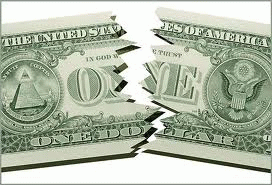Over the past month there has been a statistically improbable concurrence of events that can only be explained as a conspiracy to protect the dollar from the Federal Reserve's policy of Quantitative Easing (QE).
Quantitative Easing is the term given to the Federal Reserve's policy of printing 1,000 billion new dollars annually in order to finance the US budget deficit by purchasing US Treasury bonds and to keep the prices high of debt-related derivatives on the "banks too big to fail" (BTBF) balance sheets by purchasing mortgage-backed derivatives. Without QE, interest rates would be much higher, and values on the banks' balance sheets would be much lower.
Quantitative Easing has been underway since December 2008. During these 54 months, the Federal Reserve has created several trillion new dollars with which the Fed has monetized the same amount of debt.
One result of this policy is that most real US interest rates are negative. Another result is that the supply of dollars has outstripped the world's demand for dollars.
These two results are the reason that the Federal Reserve's policy of printing money with which to purchase Treasury bonds and mortgage backed derivatives threatens the dollar's exchange value and, thus, the dollar's role as world reserve currency.
To be the world reserve currency means that the dollar can be used to pay any and every country's oil bills and trade deficit. The dollar is the medium of international payment.
This is very helpful to the US and is the main source of US power. Because the dollar is the reserve currency, the US can cover its import costs and pay for its cost of operation simply by creating its own paper money.
If the dollar were not the reserve currency, Washington would not be able to finance its wars or continue to run large trade and budget deficits. Therefore, protecting the exchange value of the dollar is Washington's prime concern if it is to remain a superpower.
The threats to the dollar are alternative monies -- currencies that are not being created in enormous quantities, gold and silver, and Bitcoins, a digital currency.
The Bitcoin threat was eliminated on May 17 when the Gestapo Department of Homeland Security seized Bitcoin's accounts. The excuse was that Bitcoin had failed to register in keeping with the US Treasury's anti-money laundering requirements.
Washington has stifled the threat from other currencies by convincing other large currencies to out-print the dollar. Japan has complied, and the European Central Bank, though somewhat constrained by Germany, has entered the printing mode in order to bail out the private banks endangered by the "sovereign debt crisis."
That leaves gold and silver. The enormous increase in the prices of gold and silver over the last decade convinced Washington that there are a number of miscreants who do not trust the dollar and whose numbers must not be permitted to increase.
The price of gold rose from $272 an ounce in December 2000 to $1,917.50 on August 23, 2011. The financial gangsters who own and run America panicked. With the price of the dollar collapsing in relation to historical real money, how could the dollar's exchange rate to other currencies be valid? If the dollar's exchange value came under attack, the Federal Reserve would have to stop printing and would lose control over interest rates.
The bond and stock market bubbles would pop, and the interest payments on the federal debt would explode, leaving Washington even more indebted and unable to finance its wars, police state, and bankster bailouts.
Something had to be done about the rising price of gold and silver.
There are two bullion markets. One is a paper market in New York, Comex, where paper claims to gold are traded. The other is the physical market where personal possession is taken of the metal -- coin shops, bullion dealers, jewelry stores.
(Note: You can view every article as one long page if you sign up as an Advocate Member, or higher).






